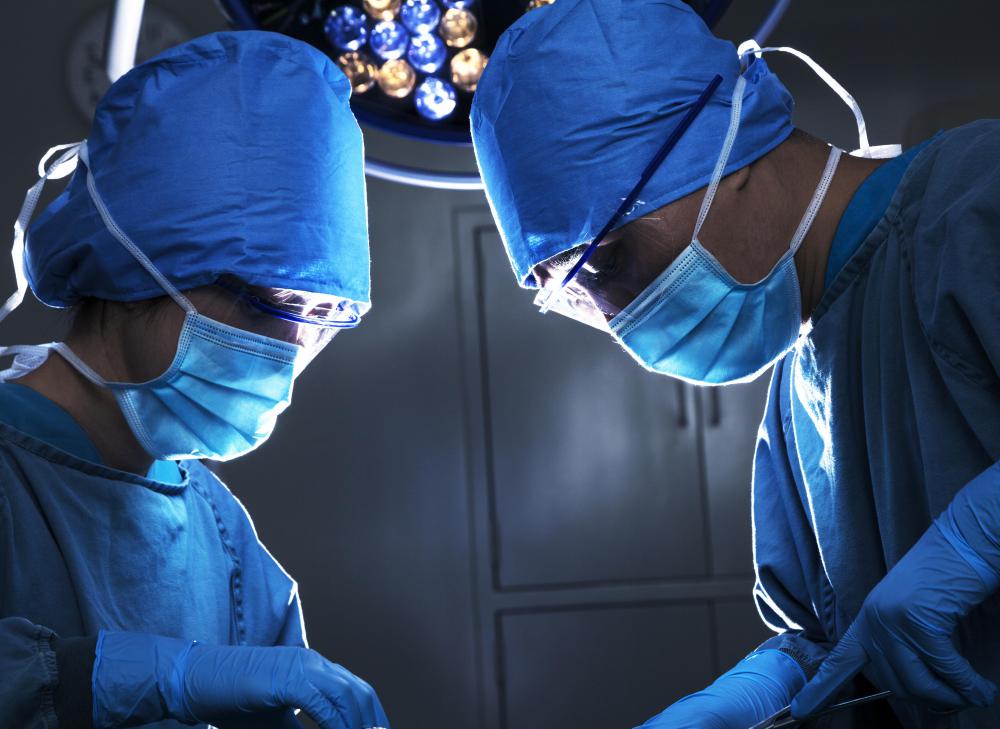At WiseGEEK, we're committed to delivering accurate, trustworthy information. Our expert-authored content is rigorously fact-checked and sourced from credible authorities. Discover how we uphold the highest standards in providing you with reliable knowledge.
What is Cardiopulmonary Bypass?
Cardiopulmonary bypass is a bypassing or going around normal heart and lung function. It’s most often used during some heart surgeries or in other instances if heart and lung function are extremely poor. Many people known this procedure better by less formal terms, such as being on a heart lung pump, bypass, or machine.
This procedure is probably one of the most important to be developed in the history of cardiothoracic surgery because with it, it became possible to effect many repairs that could not be done if the heart remained beating. The need to stop the heart, but still provide blood circulation and oxygenated blood for the body was strongly felt prior to development of a reliable and successful cardiopulmonary bypass system. Many people couldn’t have needed repairs or died because a repair undertaken on a beating heart could be inherently dangerous.

When cardiopulmonary bypass is performed it has three important elements. A perfusionist, or a person with special training in operating these machines, helps a surgeon to hook up two cannulas to large blood vessels. One of these collects the blood that would return to the heart and thus go to the lungs, and shunts that blood to the bypass machine, where it is oxygenated, just as it would receive oxygen in the lungs. The second cannula feeds the oxygenated blood back into the body so normal circulation is maintained and the body’s tissues aren’t deprived of oxygenation. A third step is to make certain that the heart isn’t beating, usually through the use of chemicals.

Most people who have cardiopulmonary bypass are only on bypass machines during an actual heart surgery. Before they even leave the operating room, they may already be off bypass. Some people require support for greater periods of time, though this is not preferable. Bypass support may especially be required if the heart continues to fail or is so badly damaged that it needs to be replaced. Some people awaiting heart or heart/lung transplant remain on cardiopulmonary bypass until they can receive a transplant.

There is some indication that even with the oxygenation provided by cardiopulmonary bypass a small amount of cell death accrues in the brain. While this seldom leads to problems, people who have many surgeries, particularly children, could be at risk for deficits due to a minimal amount of brain cell death. This isn’t noticed often, but it has led to some surgeons reevaluating certain stopped heart surgeries to determine if they truly require cardiopulmonary bypass. In some instances certain surgeries are now performed on the warm beating heart instead, though circumstances have to be just right for this type of surgery to represent minimal risk and be successful.
As mentioned, medical workers called perfusionists usually oversee cardiopulmonary bypass. These are expertly trained people, often possessing credentials and master’s level work in this field. Perfusionists are a vital part of the team when heart lung bypass is needed.
AS FEATURED ON:
AS FEATURED ON:













Discussion Comments
@Scrbblchick -- That's an interesting theory. I never thought about it that way, but you have a point, come to think of it. I've heard of people not being the same after heart surgery, but it never occurred to me that the bypass process had anything to do with it. But that makes as much sense as anything, I guess.
I have had people tell me they felt "different" after heart surgery. Some people changed for the better, but not necessarily.
I read a book several years ago about a heart surgeon who pioneered a lot of the open heart techniques we use, including the bypass machine. His name was Dr. Walt Lillehei and he helped build the first bypass machine.
I wonder if the possible cell death in the brain is what leads to the change in personality you sometimes see after people have open heart surgery and are on bypass.
I know many people who have said their loved ones were just not quite the same after the surgery. They said their loved ones were much quieter, more emotional, more apt to weep at sentimental things, etc. It could be that a close brush with death caused this, but I have to wonder, since losing a few brain cells is a real possibility with bypass.
Post your comments